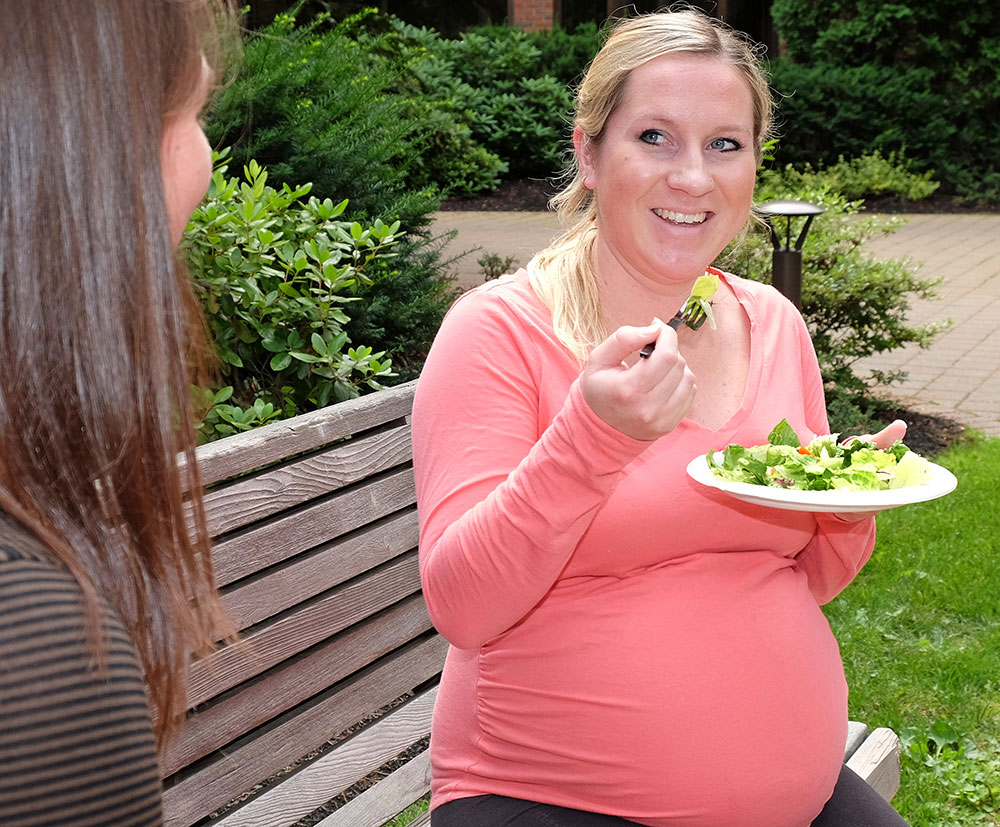Pregnancy is great opportunity to make healthy changes to your diet and give your baby the best start in life.
A diverse diet is key to healthy eating. Choose a variety of these foods:
- Grains – including breads, pasta, and oatmeal. Look for “whole grain” options.
- Fruits – fresh, canned, frozen, or dried.
- Vegetables – cooked or raw. Use dark leafy greens for salads.
- Proteins – lean meats, seafood, beans, eggs, soy products, etc.
- Dairy products – such as cheese, yogurt, and milk. Opt for low fat or fat free and make sure it is pasteurized.
Aim to fill half of your plate with fruits and vegetables.
Oils and fats are important to give you energy and build many fetal organs. Add fats sparingly to your menu. Most fats in your diets should come from plant sources (olive oil, nuts) and certain foods (seafood, avocados). Try to limit the “solid fats” that come from animal sources and added to some processed foods.
What foods should I avoid while pregnant?
Alcohol
Alcohol should be avoided completely. Even small amounts can be harmful.
Certain fish
Pregnant women should eat at least two servings of fish or shellfish per week. However, some types of fish have high levels of mercury, a metal that can cause birth defects.
Avoid fish with unacceptably high levels of mercury:
- Shark
- Swordfish
- King mackerel
- Tilefish
Limit white (albacore) tuna to 6 ounces a week
You can learn more about eating fish at the FDA website.
Other fish are safe to eat and recommended, especially those high in omega-3 fatty acids, such as salmon, herring, and lake trout. Take advantage of the abundance of fresh fish found along the Maine coast.
Foods at risk for listeria contamination.
Listeria is a bacteria that can grow in certain foods. Pregnant women have a higher risk of becoming sick after eating foods contaminated with Listeria. Listeriosis (infection with Listeria) can cause serious pregnancy complications including miscarriage, preterm delivery, and stillbirth. To protect yourself from Listeria look for pasteurized dairy products. Pasteurization is a process that destroys bacteria in food. While you are pregnant, avoid:
- Unpasteurized or raw milk,
- Cheese made with unpasteurized or raw milk,
- Refrigerated pates, meat spreads or smoked seafood,
- Raw or lightly cooked sprouts, and
- Undercooked meat, seafood or eggs.
Also follow these guidelines:
- Heat processed meats (hot dogs, cold cuts and deli meats) until steaming (165 degrees) just before serving,
- Eat cut melon right away or refrigerate it. Throw out cut melon if it has been left at room temperature for more than four hours.
How much weight should I gain?
Starting your pregnancy at a healthy weight and avoiding excessive weight gain helps prevent pregnancy complications, such as gestational diabetes, preeclampsia (hypertension associated with pregnancy), and cesarean delivery. A healthy weight also benefits your baby by decreasing the risk of macrosomia (overweight fetus), birth injury, and childhood obesity.
The amount of weight gain that is recommended depends on how much you weigh before you became pregnant. In general, women who are:
- Normal weight prior to pregnancy – should gain 25-35 pounds
- Underweight prior to pregnancy – should gain 28-40 pounds
- Overweight or obese – should gain 11-25 pounds
The Department of Agriculture has a great interactive tool to determine how much weight you should gain and your suggested calorie intake by trimester.

